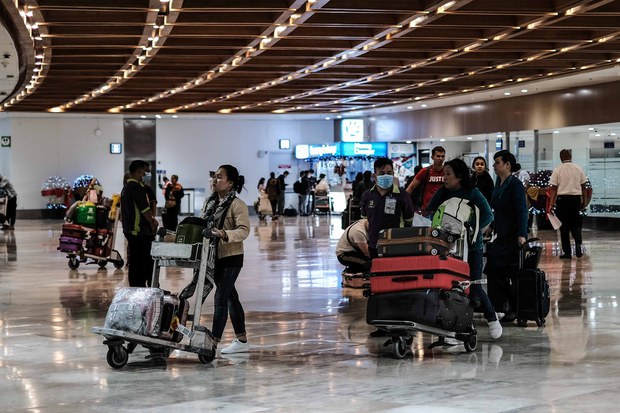Marcos promises to review protections for Philippine workers in Kuwait
2023.01.30
Manila
 Overseas Philippine workers arrive at the Ninoy Aquino International Airport in Manila before the country was locked down by the COVID-19 pandemic, Jan. 23, 2020.
Overseas Philippine workers arrive at the Ninoy Aquino International Airport in Manila before the country was locked down by the COVID-19 pandemic, Jan. 23, 2020.
After attending the wake of a Filipina maid slain in Kuwait, Philippine President Ferdinand Marcos Jr. promised her family cash assistance and said his government would hold a top-level meeting with Kuwaiti officials to review protections for expatriate workers.
Marcos also sought to assure the survivors of Jullebee Ranara, 35, that her death would be investigated. The woman’s body was found partly burned and left in the Kuwaiti desert after her family reported her missing earlier this month.
“All the assistance that can be given, will be given,” Marcos told reporters after attending Ranara’s wake in Las Pinas city, Metro Manila. “I assured them that we will attend to their needs.”
“We are also scheduling a bilateral meeting with Kuwait to look at the agreement that we have to see if there are any weaknesses that allowed this to happen and [that] those weaknesses are remedied so that the agreement is stronger and more supportive [to our] workers,” Marcos said. “We hope that this will not happen again to any of our countrymen.”
Kuwaiti Foreign Minister Sheikh Salem Al Sabah met on Sunday with Jose Cabrera III, the charge d’affaires of the Philippine Embassy in Kuwait, to “convey his deepest condolences to the family and Philippine government on the brutal and tragic death” of Ranara, according to the embassy.
The Kuwaiti government has arrested a suspect, who according to Philippine authorities, is the 17-year-old son of Ranara’s employer. The boy is “currently in detention and will be punished for this heinous crime,” the embassy said in a statement.
“Sheikh Salem added that the actions of the perpetrator do not in any way reflect the character and values of Kuwaiti society, the Kuwaiti people and the Kuwaiti government,” the statement said.
Cabrera expressed appreciation for the cooperation and assistance of Kuwaiti authorities, particularly the swift arrest of the suspect and the repatriation of Ranara’s body.
Anger grows
As anger over the maid’s killing grew in the labor-exporting Southeast Asian country, one Philippine lawmaker, Sen. Raffy Tulfo, proposed “a total labor deployment ban” in the oil-rich Persian Gulf state. He said workers should instead be sent to labor markets where they are properly compensated and treated with respect.
“Guam is a new market for OFWs, currently needing thousands of skilled workers. In fact, Guam, a United States Territory, reportedly prefers to hire more Filipino workers,” Tulfo said, referring to overseas Filipino workers.
Labor group Migrante International, which monitors the condition of Philippine workers abroad, said the killing in Kuwait and others “are not isolated incidents” in the Middle East, where many countries require workers to surrender their passports.
“As long as the Philippine government and economy remain highly dependent on migrant Filipinos’ remittances, cases of abuse and even murder of our countrymen will not end,” said Joanna Concepcion, chairwoman of Migrante.
“The real solution is an end to the government’s labor export program and the generation of decent jobs within the country which, we believe, are only possible through genuine land reform and national industrialization,” she said.
Millions work abroad
About 10 million, or a tenth of the Philippines’ population, live and work overseas, making the Filipino diaspora one of the biggest in Asia, according to government figures. Most are employed as seafarers and domestic workers in countries that offer little protection.
Based on government records, about 500,000 Filipinos are in Kuwait and are among more than 3.5 million scattered in the Middle East.
Filipinos working overseas can be exposed to danger because many are undocumented or traveled abroad through illegal employment networks.
Remittances from the workers have traditionally kept the Philippine economy afloat, leading the government to call them modern-day heroes for their sacrifices.
Manila previously banned the deployment of workers to Kuwait because of Filipino deaths there. Then-President Rodrigo Duterte made the decision after the body of Joanna Demafelis, 29, who also worked as a domestic helper, was found stuffed in a freezer.
Duterte lifted the ban in 2018 after signing an agreement with the Kuwait government to ensure better treatment of Filipino workers.
The agreement guaranteed Filipinos’ the right to use their phones and keep their passports, which have been confiscated by Arab employers. It also said workers or Philippine authorities had to approve transfers to another employer.
Jeoffrey Maitem in Davao City, Philippines, contributed to this report.







